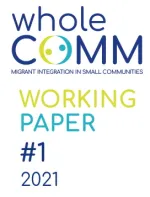A whole-of-community approach to study post-2014 migrants’ integration in small and medium-sized towns and rural areas State of the art, concepts, theory and methodology

Working Paper No. 1
This working paper presents the rationale, theory and methods of the Whole-COMM project. Over the last few years, the EU has received unprecedented numbers of migrants and asylum seekers, often in an unorderly way. This has led to a growing immigrant presence in scarcely prepared small and medium-sized towns and rural areas (henceforth: SMsTRA). The way in which these local communities respond to this challenge will deeply shape the future of integration in Europe. Whole-COMM proposes to address these issues through an innovative whole-of-community (WoC) theoretical approach which conceives of migrant integration as a process of communitymaking that: takes place in specific local contexts characterised by distinct configurations of structural factors; is brought about by the interactions of multiple actors with their multilevel and multi-situated relations; and is open-ended and can result in either more cohesive or more fragmented social relations. In this Working Paper we first present the relevant background scientific literature, showing how research on local migration policy and policymaking processes has just begun to address the specificity of migration processes in SMsTRA, and how existing studies remain confined to either extreme cases or nationally based small samples of localities. Hence, in the second section we elaborate on the WoC theoretical approach by presenting a typology of SMsTRA and formulating specific hypotheses on integration policies, policymaking relationships and integration outcomes in each type of locality. In the third and last section we present our innovative case-selection strategy as well as the research methods and techniques employed to address the project’s research questions.